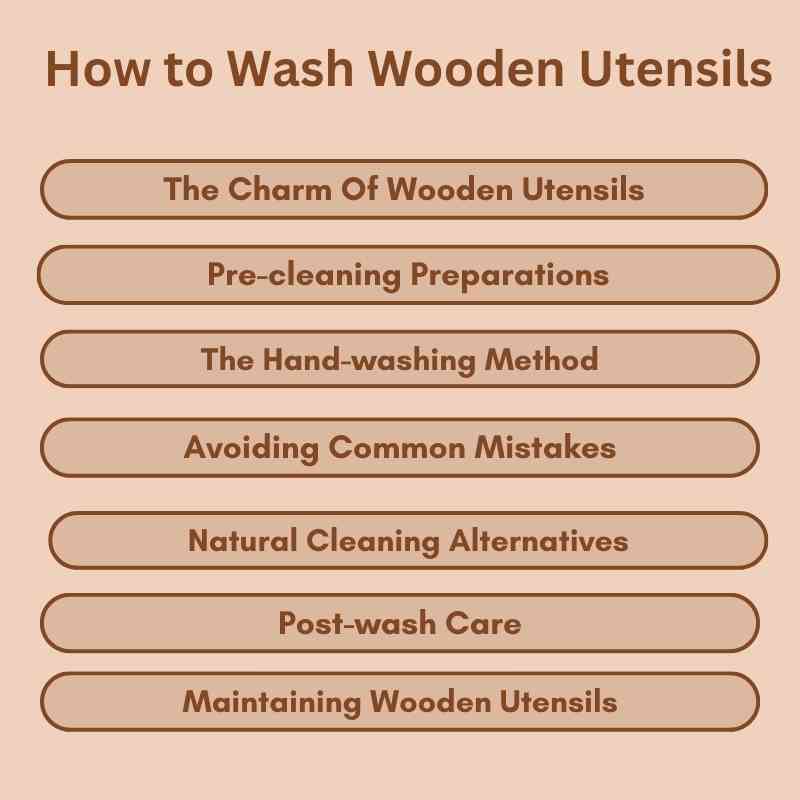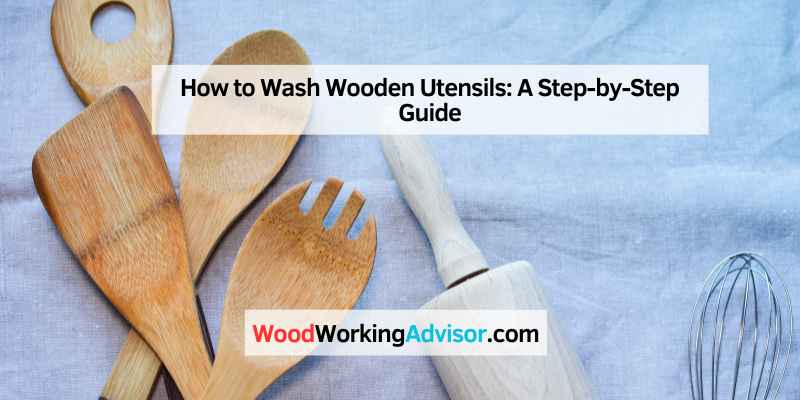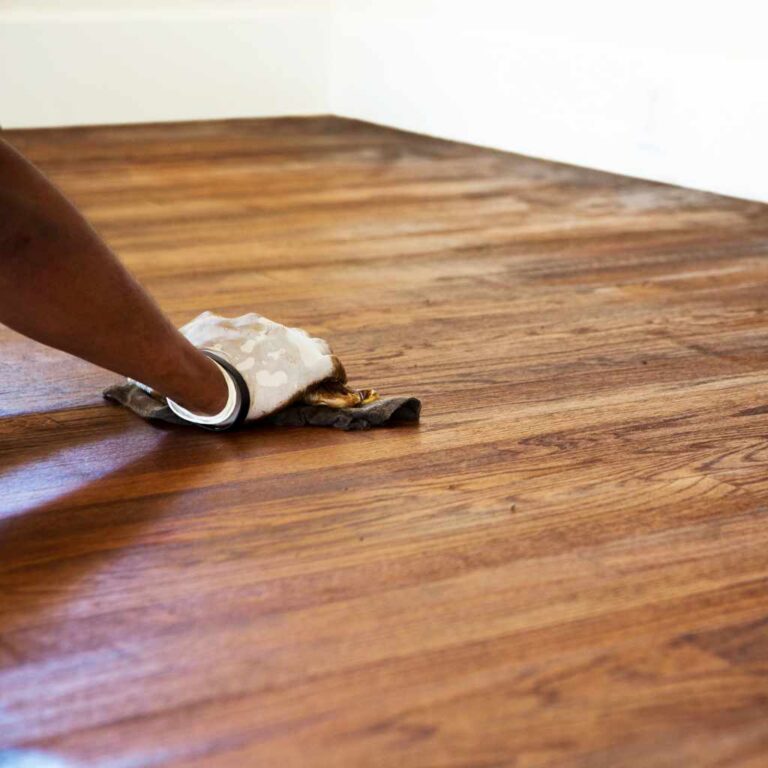How to Wash Wooden Utensils: A Step-by-Step Guide
To wash wooden utensils, hand wash with mild soap and water, then air dry. It’s important to avoid soaking them in water or using the dishwasher, as this can damage the wood.
Wooden utensils should be cleaned promptly after use to prolong their lifespan and maintain their quality. Wooden utensils are a staple in many kitchens due to their natural, eco-friendly, and durable properties. Whether it’s a wooden spoon, spatula, or cutting board, these items require proper care to ensure their longevity and hygiene.
By following the right cleaning methods, you can keep your wooden utensils in top condition and continue to enjoy their functionality in your kitchen. Let’s explore the best practices for washing and maintaining wooden utensils to preserve their natural beauty and usefulness.
The Charm Of Wooden Utensils
Wooden utensils have an undeniable charm that brings a touch of warmth and natural beauty to any kitchen. The unique grain patterns and smooth texture of wooden utensils not only add a rustic appeal to your cooking space but also provide a comfortable and ergonomic grip. Whether it’s a classic wooden spoon, a sturdy cutting board, or a set of elegant salad servers, these timeless kitchen essentials offer both functionality and aesthetic appeal.
Why Choose Wooden Utensils
Wooden utensils are a popular choice for cooking and serving due to their natural and non-toxic properties. Unlike metal or plastic utensils, wooden utensils do not react with acidic ingredients, ensuring that your food remains uncontaminated and free from metallic tastes. Additionally, the soft nature of wood helps to preserve the delicate surfaces of cookware, making them ideal for non-stick pans and delicate bakeware.
Lifespan And Durability
With proper care, wooden utensils can last for many years, making them a sustainable and eco-friendly option for your kitchen. Their durability and resistance to wear and tear ensure that they can withstand the rigors of everyday cooking. By following simple maintenance practices, such as hand washing and periodic oiling, you can extend the lifespan of your wooden utensils, allowing you to enjoy their timeless appeal for generations to come.
Pre-cleaning Preparations
To prepare for washing wooden utensils, start by gently scraping off food residue with a soft brush. Then, hand wash in warm, soapy water, rinse thoroughly, and air dry completely to prevent warping. Avoid soaking to maintain the utensils’ quality and longevity.
Gather Your Materials
Before starting the pre-cleaning process, gather the materials you’ll need to wash your wooden utensils properly. You’ll need:
- A soft sponge or cloth
- Mild dish soap
- Warm water
Initial Rinse
The first step in pre-cleaning wooden utensils is to rinse them thoroughly under warm water. This will help remove any loose food particles from the surface of the utensils.
Scrub With Soap
Next, apply a small amount of mild dish soap to a soft sponge or cloth. Gently scrub the surface of the wooden utensils, paying close attention to any areas with visible food residue or stains.
Rinse And Dry
Rinse the wooden utensils thoroughly under warm water to remove any soap residue. Then, pat them dry with a clean towel or cloth.
Final Step: Seasoning
After washing and drying, it’s important to season your wooden utensils to keep them in good condition. Use a food-safe oil, such as coconut oil, to coat the surface of the utensils. Let them sit for a few hours, or overnight, before wiping away any excess oil with a clean cloth. This will help keep your wooden utensils hydrated and protected.
By following these simple pre-cleaning preparations, you can ensure that your wooden utensils remain clean, hygienic, and in good condition for years to come. Remember to wash your wooden utensils by hand and avoid soaking them in water or putting them in the dishwasher to prevent damage.

The Hand-washing Method
When it comes to washing wooden utensils, the hand-washing method is the best approach to ensure their longevity. Washing wooden utensils by hand helps to prevent any damage that may occur in the dishwasher or from prolonged exposure to water. By following a few simple steps, you can keep your wooden utensils clean and well-maintained.
Soap Selection For Wooden Utensils
When selecting soap for washing wooden utensils, it is important to choose a mild and gentle option. Harsh detergents or abrasive cleaners can strip the natural oils from the wood, leaving it dry and prone to cracking. Opt for a mild dish soap that is free from harsh chemicals or fragrances. This will help to maintain the integrity of the wood while effectively removing any food residue or stains.
Washing Technique
When washing wooden utensils, it is important to follow the proper technique to ensure their cleanliness and preservation. Here is a step-by-step guide:
- Fill a sink or basin with warm water.
- Add a small amount of mild dish soap and mix well.
- Place the wooden utensils into the soapy water.
- Gently scrub the utensils using a soft sponge or cloth, paying attention to any stubborn stains or food residue.
- Rinse the utensils thoroughly under warm running water to remove any soap residue.
- Pat dry with a clean towel.
- Allow the utensils to air-dry completely before storing them.
By following this washing technique, you can effectively clean your wooden utensils without causing any damage or compromising their quality.
Avoiding Common Mistakes
Properly caring for your wooden utensils is essential to maintain their longevity and prevent damage. While washing wooden utensils may seem straightforward, there are common mistakes that you should avoid to ensure their preservation. In this section, we will discuss two crucial aspects to consider: why soaking is harmful and the dangers of using a dishwasher.
Why Soaking Is Harmful
Soaking wooden utensils in water for an extended period can cause irreversible damage. Wood is a porous material, and excessive moisture can lead to swelling and cracking. To avoid this, it is best to limit the contact of wooden utensils with water as much as possible. Instead of soaking, opt for a quick rinse under running water.
Additionally, avoid leaving wooden utensils submerged in soapy water. The harsh chemicals in dish soap can strip the natural oils from the wood, causing it to dry out and become brittle. Remember to wash your wooden utensils with a gentle dish soap and rinse them thoroughly to remove any residue.
Dishwasher Dangers
Using a dishwasher to clean wooden utensils is a common mistake that can lead to irreversible damage. The high heat and strong water pressure in dishwashers can cause the wood to warp, crack, or lose its natural finish. Therefore, it is crucial to hand wash your wooden utensils to preserve their quality.
If you are unsure whether your wooden utensils are dishwasher safe, look for a dishwasher safe symbol on the item. However, as a general rule, it is best to err on the side of caution and hand wash wooden utensils to ensure their longevity.
In conclusion, by avoiding common mistakes such as soaking wooden utensils and using a dishwasher, you can effectively care for your wooden utensils and extend their lifespan. Remember to handle them with care, wash them gently with mild soap, and air-dry them promptly after each use. By following these practices, you can enjoy the beauty and functionality of your wooden utensils for years to come.
Natural Cleaning Alternatives
Keep your wooden utensils clean with natural alternatives to traditional cleaning products. To wash them, use a mixture of baking soda and vinegar, then smooth with sandpaper and season with coconut oil. Avoid soaking them in water and never put them in the dishwasher to prevent damage.
Wooden utensils can be a great addition to your kitchen. They are durable, long-lasting, and have a natural aesthetic appeal. However, cleaning wooden utensils can be a bit tricky, as they require special care to prevent damage. While there are many commercial cleaning products available, using natural cleaning alternatives is a great option for those who want to avoid harsh chemicals. Here are some natural cleaning alternatives that you can use to wash your wooden utensils:
Using Lemon and Salt:
Lemons are a natural disinfectant and can help remove stains and odors from wooden utensils. To clean your wooden utensils using lemon and salt, follow these steps:
1. Cut a lemon in half.
2. Sprinkle some salt on the lemon half.
3. Rub the lemon half on the wooden utensil, applying pressure as needed.
4. Rinse the utensil with warm water and dry it thoroughly.
Baking Soda as a Cleaner:
Baking soda is another natural cleaning alternative that can be used to clean wooden utensils. Baking soda is a gentle abrasive that can help remove stains and odors from wooden utensils. To clean your wooden utensils using baking soda, follow these steps:
1. Mix 1 tablespoon of baking soda with 1 teaspoon of water to form a paste.
2. Apply the paste to the wooden utensil.
3. Use a soft-bristled brush to scrub the utensil, applying pressure as needed.
4. Rinse the utensil with warm water and dry it thoroughly.
Using natural cleaning alternatives is a great way to clean your wooden utensils without using harsh chemicals. These methods are safe and effective, and can help your wooden utensils last for years to come.
Post-wash Care
After washing your wooden utensils, proper post-wash care is essential to maintain their quality and prolong their lifespan. Here are some important tips to follow:
Proper Drying
- Air-dry wooden utensils thoroughly to prevent moisture buildup.
- Place them upright in a well-ventilated area to ensure even drying.
- Avoid stacking wet utensils to prevent mold growth.
Storage Tips
- Store wooden utensils in a dry place away from direct sunlight.
- Avoid storing them near heat sources or in humid areas.
- Consider using a utensil holder or drawer organizer to keep them organized.

Maintaining Wooden Utensils
When it comes to maintaining wooden utensils, proper care is essential to ensure their longevity and hygiene.
Regular Maintenance
- Hand wash wooden utensils with mild soap and water after each use.
- Dry them immediately with a clean towel to prevent warping.
- Regularly oil wooden utensils with mineral oil to keep them moisturized.
Dealing With Stains And Odors
- For stains, create a paste of baking soda and water to gently scrub the affected area.
- To remove odors, rub the utensil with a lemon half or apply a mixture of vinegar and water.
- Avoid soaking wooden utensils in water as it can cause damage and warping.
Refurbishing And Seasoning
To wash wooden utensils, start by washing them by hand with hot soapy water and a scrubbing sponge. Avoid soaking them in water or putting them in the dishwasher, as prolonged exposure to water can damage the wood. After washing, air-dry the utensils to extend their lifespan.
Sanding And Smoothing
To refurbish wooden utensils, start by sanding and smoothing the surface to remove any rough patches or stains.
Oiling For Longevity
Next, apply a high-quality food-grade oil to the utensils to protect the wood and extend their lifespan.
Frequently Asked Questions
What Is The Best Way To Sanitize Wooden Utensils?
To sanitize wooden utensils, wash them by hand with hot soapy water and a scratchy sponge. Avoid soaking them in water or putting them in the dishwasher as it can damage the wood. Air-dry them after washing to extend their lifespan.
Can You Machine Wash Wooden Utensils?
No, you should not machine wash wooden utensils. Wooden items should only be washed by hand with hot soapy water and air-dried immediately. Soaking them in water or putting them in the dishwasher can damage the wood, causing it to swell or crack.
To sanitize wooden utensils, you can use a mixture of baking soda and vinegar or rub them with a halved lemon.
Do You Wash Wooden Utensils With Soap?
Yes, wash wooden utensils with soap and water, then air-dry them after use. Avoid soaking in water and never put them in the dishwasher.
Should Wooden Utensils Be Soaked In Water?
No, wooden utensils should not be soaked in water. Prolonged exposure to water can damage the wood, causing it to swell and eventually crack. It is recommended to wash wooden utensils by hand with hot soapy water and dry them immediately.
Avoid using a dishwasher as the high heat can warp the wood and degrade its finish.
Conclusion
Properly washing wooden utensils is essential for maintaining their quality and longevity. By hand-washing with mild soap and avoiding soaking, you can keep your wooden utensils in top condition. Regular maintenance, such as sanding and oiling, will ensure they remain safe and hygienic for use in the kitchen.







